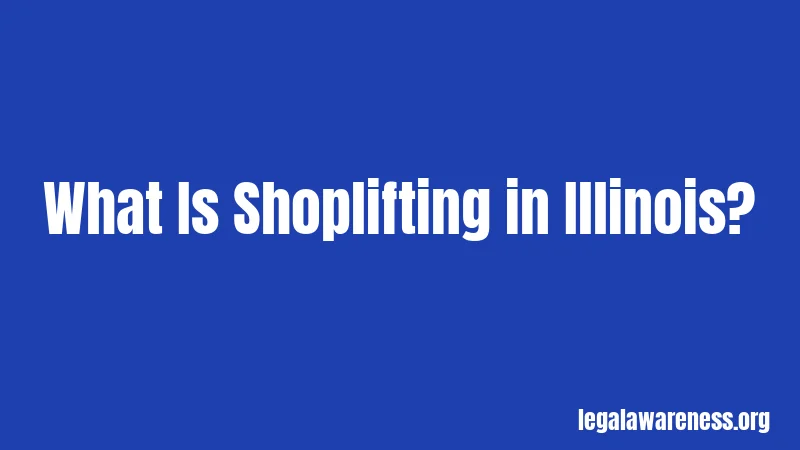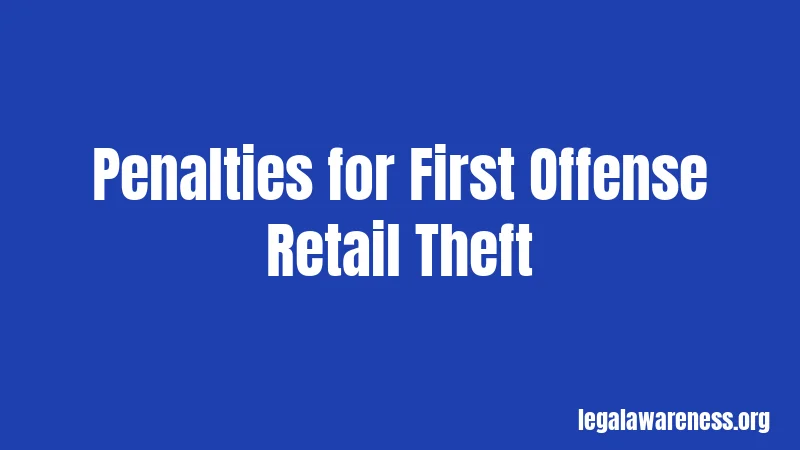Shoplifting Laws in Illinois (2026): What Actually Gets You in Trouble
Most people think shoplifting is just a simple theft charge. But honestly, Illinois has some of the strictest retail theft laws in the country. The penalties can wreck your life, and they’re way harsher than you might expect.
Let’s break down exactly what counts as shoplifting. More importantly, let’s talk about what happens if you get caught. This stuff matters, and you need to know it.
What Is Shoplifting in Illinois?

Okay, here’s the thing. Illinois doesn’t actually call it “shoplifting.” The legal term is “retail theft.” But they mean the same thing.
Retail theft happens when you take merchandise from a store without paying for it. It sounds simple, right? The tricky part is that it covers way more than just hiding items in your pocket. You’re not alone if you don’t realize how broad these laws really are.
Taking something without paying is the obvious form. But Illinois also considers it retail theft if you alter price tags to pay less. Same thing if you swap barcodes or remove security devices. Even putting something in a different container to avoid paying counts as theft.
Here’s where it gets interesting. You can get charged with retail theft without ever leaving the store. The law says you just need to move the merchandise with the intent to steal it. That’s basically it. You don’t need to walk out the door for police to arrest you.
The Basics: What Exactly Is Illegal
Illinois breaks down retail theft pretty clearly. Let me explain what actually violates the law.
Taking merchandise without paying. This is the most obvious one. You grab something off the shelf and leave without paying. That’s retail theft, period.
Switching or removing security devices. Stores put those magnetic strips on clothing for a reason. If you remove them before paying, that’s theft. Same goes for removing electronic price tags or antitheft devices of any kind.
Changing price tags. This one surprises people. You see something you like but want a better price. You find a cheaper item’s tag and swap it. Boom, that’s retail theft. You’re essentially defrauding the store.
Using a different container to avoid payment. Here’s a sneaky one. You bring in items from home or take items from elsewhere in the store. You put expensive items in cheap packaging to pay less. That counts as theft under Illinois law.
Concealing merchandise. Even if you don’t leave the store, hiding items in your clothes or a bag shows intent to steal. Officers can arrest you right there in the aisle.
Switching items from one package to another. You like the expensive item but want to pay for the cheap one? That’s fraud, and Illinois treats it seriously.
Not sure if something counts as theft? Basically, if you’re trying to get merchandise without paying full value, Illinois will charge you with retail theft. Pretty straightforward.
Penalties for First Offense Retail Theft

Here’s where things get real. The penalties in Illinois aren’t small fines you can brush off.
For a first retail theft offense, you’re typically looking at a Class B misdemeanor. That means up to six months in jail, plus a fine up to $500. Technically, you could face both jail time and the maximum fine at the same time.
But wait, there’s more to know.
The actual penalty depends on the value of what you stole. If you took items worth less than $150, you face Class B misdemeanor charges. That’s the lighter end of things. Still serious, but better than the alternatives.
If the merchandise value reaches $150 to $300, the charge bumps up to a Class A misdemeanor. Now you’re looking at up to one year in jail and a fine up to $2,500. Yeah, that’s a massive jump from the previous tier.
Stolen merchandise worth $300 to $2,000? That’s still a Class A misdemeanor, same penalties as the $150 to $300 range.
Once you hit $2,000 or more, Illinois charges you with a felony. We’re talking about Class 4 felony charges. You could go to prison for one to three years. The fines can reach $25,000. Your life changes completely at this point.
Here’s something most people miss. Even for a first offense, you get a permanent criminal record. That follows you for jobs, housing, and background checks. Honestly, this is the part that ruins people’s lives more than jail time.
What Happens With Multiple Offenses
Okay, pause. Read this carefully. Multiple offenses make everything exponentially worse.
A second retail theft conviction within a five-year period? That automatically becomes a Class 4 felony. No exceptions. Even if you only stole a shirt worth $20, the second charge is a felony.
You’re looking at prison time from one to three years. Plus fines up to $25,000. Your criminal record now shows a felony conviction.
A third retail theft conviction? Class 3 felony. Now we’re talking two to five years in prison. The situation got serious real fast.
Illinois wants to discourage repeat offenders, and they’ve made the consequences crystal clear. One mistake might be forgivable in some eyes. A second one? The state treats you very differently.
This is why knowing the law matters. You could make one mistake and recover from it. Make two? Your options become way more limited.
Security Footage and Evidence

Here’s what you need to understand about how stores actually catch shoplifters.
Most retail stores have cameras everywhere. I’m not exaggerating. The dressing rooms, aisles, checkout areas, parking lots. Security personnel watch these feeds constantly. They can spot suspicious behavior pretty easily.
When they suspect shoplifting, they gather evidence first. They document what you took, when you took it, and whether you paid for it. Store security might stop you before you leave. Sometimes they wait and let you walk out, then approach you in the parking lot.
Police involvement usually happens once you’ve left the store. That’s when it becomes an official criminal matter. Before that, it’s sometimes handled as a store security issue.
Here’s the important part: video evidence is strong. It clearly shows what happened. That’s why stores rely on it so heavily. If you’re caught on camera, your defense becomes much more difficult.
Trying to Return Stolen Merchandise
Wondering if returning stolen items helps your case? Honestly, it helps a little. But not as much as you’d think.
In Illinois, attempting to return stolen merchandise doesn’t erase the theft. You still committed retail theft when you took it. The return doesn’t undo that charge.
However, judges sometimes consider it as a mitigating factor. If you got caught and immediately returned the items, a judge might go easier on sentencing. They might see it as remorse or good character.
But here’s the reality. You still get charged. You still go through the legal system. The return just might make your sentence slightly less severe. It’s not a get-out-of-jail card.
Civil Penalties from the Store
Now here’s something that happens separately from criminal charges.
When a store catches you shoplifting, they can demand payment for the merchandise. That’s the theft itself. But Illinois lets stores also charge you for civil damages.
Many stores demand you pay for the merchandise plus a damages penalty. This can be $100 to $500 depending on the store’s policy. Some stores demand even more.
This happens even if the criminal charges get dropped. The civil penalty is separate from criminal court. You could pay the store and still face criminal prosecution. They’re two different legal processes.
Some people negotiate with stores to avoid police involvement. If you pay the damages and the store value, the store sometimes agrees not to press charges. But they don’t have to agree. Never assume they will.
Special Cases and Age Considerations
Minors get some special consideration in Illinois, but not much.
If you’re under 17, Illinois juvenile courts handle your case instead of adult court. That sounds better, but understand this: a juvenile record still follows you. It affects college applications, job background checks, and security clearances.
Juvenile records are supposedly sealed when you turn 17 or 18. In reality, they can be unsealed in certain situations. They’re not truly private, especially for serious theft charges.
Parents are sometimes held liable for a minor’s shoplifting. The store can seek damages from the parents, not just the teen. This creates family conflict and financial strain.
Adults have no special considerations. Age doesn’t reduce penalties. If you’re 60 years old or 25 years old, the charges and sentences are the same.
Shoplifting and Immigration Status
Here’s something crucial if you’re not a US citizen.
A shoplifting conviction can trigger deportation proceedings. It counts as a crime of moral turpitude in some cases. That’s immigration legal-speak for a crime involving dishonesty or fraud.
Even a misdemeanor retail theft conviction can make you deportable. You could be arrested for shoplifting and end up facing immigration charges too.
If you’re on a visa, this absolutely destroys your status. If you’re seeking citizenship, a theft conviction makes it way harder. If you’re undocumented, criminal charges increase deportation risk significantly.
This is serious stuff. If you’re not a citizen and facing shoplifting charges, getting an immigration lawyer is not optional. It’s absolutely necessary.
How to Stay Out of Trouble
Here’s the practical advice. This is the part that actually helps you.
Don’t take merchandise without paying. Obvious, but it needs saying. No item is worth a criminal record.
Be aware of what counts as theft. Don’t switch price tags thinking it’s harmless. Don’t remove security devices. Don’t put expensive items in cheap packaging. These all count as retail theft.
Keep receipts for everything you buy. Seriously. If store security questions why you have an item, you want proof you paid for it.
Don’t carry bags or containers into stores without permission. Many stores watch for this specifically. Large bags or backpacks raise red flags with security.
Be extra careful with fitting rooms. Don’t take items in and take different items out. That raises immediate suspicion and can result in charges.
If you’re tempted by something, remember the consequences. A criminal record affects your job prospects, housing options, and future opportunities. Honestly, it’s not worth it.
What to Do If You’re Caught
Okay, this one’s critical. Stay with me here.
First, don’t run or resist. If security approaches you, cooperate calmly. Resisting arrest or fleeing charges adds additional criminal counts. That makes everything worse.
Don’t admit to anything beyond what you absolutely must. Be polite and respectful. But don’t confess or explain your actions. Anything you say can be used against you in court.
Ask to speak to a lawyer. This is your right. Say it clearly: “I want to speak to a lawyer.” Then stop talking. Don’t answer questions after that.
If police are involved, they’ll give you information about your rights. Listen carefully. You have the right to an attorney. If you can’t afford one, you can request a public defender.
Contact a criminal defense attorney immediately. Don’t wait. Don’t think you can handle this alone. A good lawyer might get charges reduced or dismissed. They know how to navigate the system.
Frequently Asked Questions
Can a store employee stop me from leaving with merchandise?
Yes, store employees can detain you if they suspect you of shoplifting. But they have limits. They can hold you briefly to verify you paid. They can’t use excessive force. They can’t take you somewhere against your will for very long. Contact police if you feel threatened during a detention.
Does paying for stolen merchandise later make the charge go away?
No. Paying later doesn’t erase the theft. You still committed retail theft when you took the item. Paying might help with sentencing, but you still face criminal charges and a court case.
Can I get a shoplifting charge sealed from my record?
In Illinois, yes, but it’s complicated. After a conviction, you have to wait a certain amount of time before petitioning to seal the record. For misdemeanors, it’s typically five years. For felonies, it’s longer. You’d need a lawyer to handle this process.
Does shoplifting show up on background checks?
Yes. Criminal convictions show on background checks, especially for employment or housing. Sealed records might not appear, but they can be opened in certain circumstances. You should assume any conviction will show up.
What’s the difference between retail theft and burglary?
Retail theft is taking merchandise from a store without paying. Burglary involves entering a building with intent to commit a crime. Burglary is a much more serious felony. Shoplifting is usually a misdemeanor unless the amount is high or you’re a repeat offender.
Final Thoughts
Illinois takes retail theft seriously. Really seriously. The laws are broad, the penalties are stiff, and the consequences follow you for years.
Now you know the basics. The laws are clear, even if they seem harsh. The penalties are real, and they impact your future in ways beyond just jail time or fines.
If you’re facing charges, get a lawyer immediately. If you’re tempted to steal, remember everything you just read. The consequences aren’t worth it.
Stay informed, stay legal, and when in doubt, ask questions before you act.
References
Illinois Criminal Code: Retail Theft (720 ILCS 5/16-1)
Illinois Sentencing Guidelines for Retail Theft
Illinois Courts: Criminal Charges and Sentencing Information
Legal Aid Chicago: Criminal Defense Information for Illinois Residents
Illinois Department of Justice: Consumer Fraud and Retail Theft Resources
